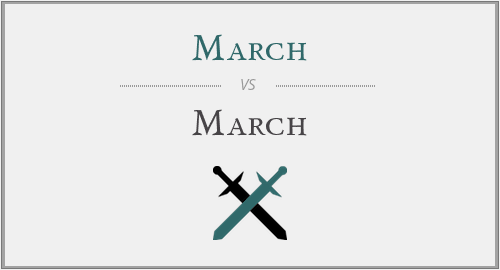March vs. March
Just before we get started, it's important to clarify that there’s no rule that the word ”march” must never be used with capital letters. In other words, writing ”march” with a capital letter does not automatically change its meaning – at least not if it’s at the beginning of a sentence, as this case undoubtedly requires a capital letter.
Here, we’re talking about the actual clue that the first letter of the word gives us if written in the middle of a sentence. Anyway, let’s not confuse you further without concretely discussing and explaining each word. Find a detailed explanation for how to use ”March” and ”march” correctly below.
When do we use “March”?
Written with a capital letter in the middle of a sentence – so not for the reason that it’s the first word in a phrase – “March” has a sole meaning. It’s written with a capital letter regardless of its location within a phrase because it is the word for the third month of the year in the Gregorian calendar. “March” is the name of the month that comes after February and before April, hence as a proper noun, it will always be written with a capital letter.
Example: Spring officially comes in March. – “March” is the name we call the third month of the year, which is why it’s always written with a capital letter regardless of its position within a phrase.
When do we use “march”?
The word “march”, on the other hand, is a little bit more versatile. Written like this, it can be used both as a noun and as a verb, depending on the circumstances. As a noun, the word defines either an organized walk by a group, intended to show and express their disagreement with or support for, something, or a special type of walk to a rhythm particular to soldiers.
When used as a verb, “march” refers either to the action of walking somewhere as a group, in an organized way, in order to show or express disagreement or support of something, or to the action of walking together with regular steps as soldiers do. Practically, as a verb, the word “march” has quite the same meanings as the noun “march”, but as an action.

Quick note here, that for the word “march” to carry all these meanings as a noun or a verb, it does not have to be written in lowercase. In fact, if it happens to appear in the beginning of a sentence, it will naturally be written with a capital letter. If this is the case, the only way to tell the difference between these meanings and the name of the third month of the year will be to decipher from the context.
Example 1: We’d like to go on a march to show how much we disagree with their decision. – As a noun, “march” defines an organized walk by a group showing their opinion about something.
Example 2: The soldiers performed a great march at the parade. – “march” may also be used as a noun to define the type of organized walk specific for soldiers.
Example 3: Our group will march on Saturday to show how much we disagree with their decision. – As a verb, “march” defines the action of walking in an organized way, as a group, to show disagreement.
Example 4: When soldiers march, they walk together with regular steps. – “march” can also be used as a verb when referring to the action of walking in an organized way, specific for soldiers.
Conclusion
Despite sounding and being spelled perfectly identically, “March” and “march” have completely different meanings, even the word order differs according to the circumstances under which they are used. This pair of words is therefore an excellent example of a homonym, which means the words are spelled and sound identical, whilst holding different definitions.
What you could remember in order to use them correctly, is that the capital letter is always a perfect clue if it appears in the middle of a sentence, that we’re talking about the name of the month and not about the verb or noun “march”.




Have a discussion about this article with the community:
Report Comment
We're doing our best to make sure our content is useful, accurate and safe.
If by any chance you spot an inappropriate comment while navigating through our website please use this form to let us know, and we'll take care of it shortly.
Attachment
You need to be logged in to favorite.
Log In